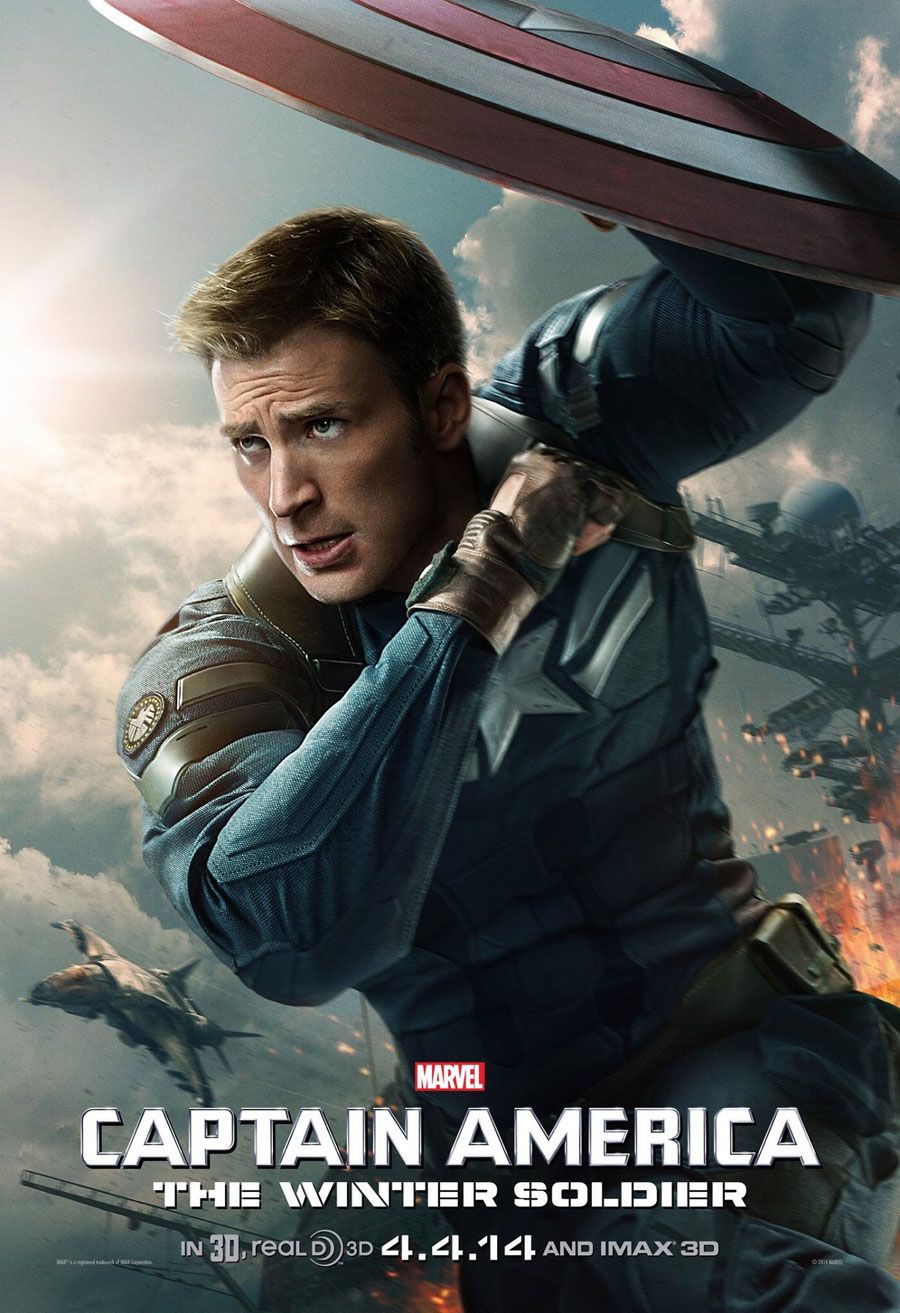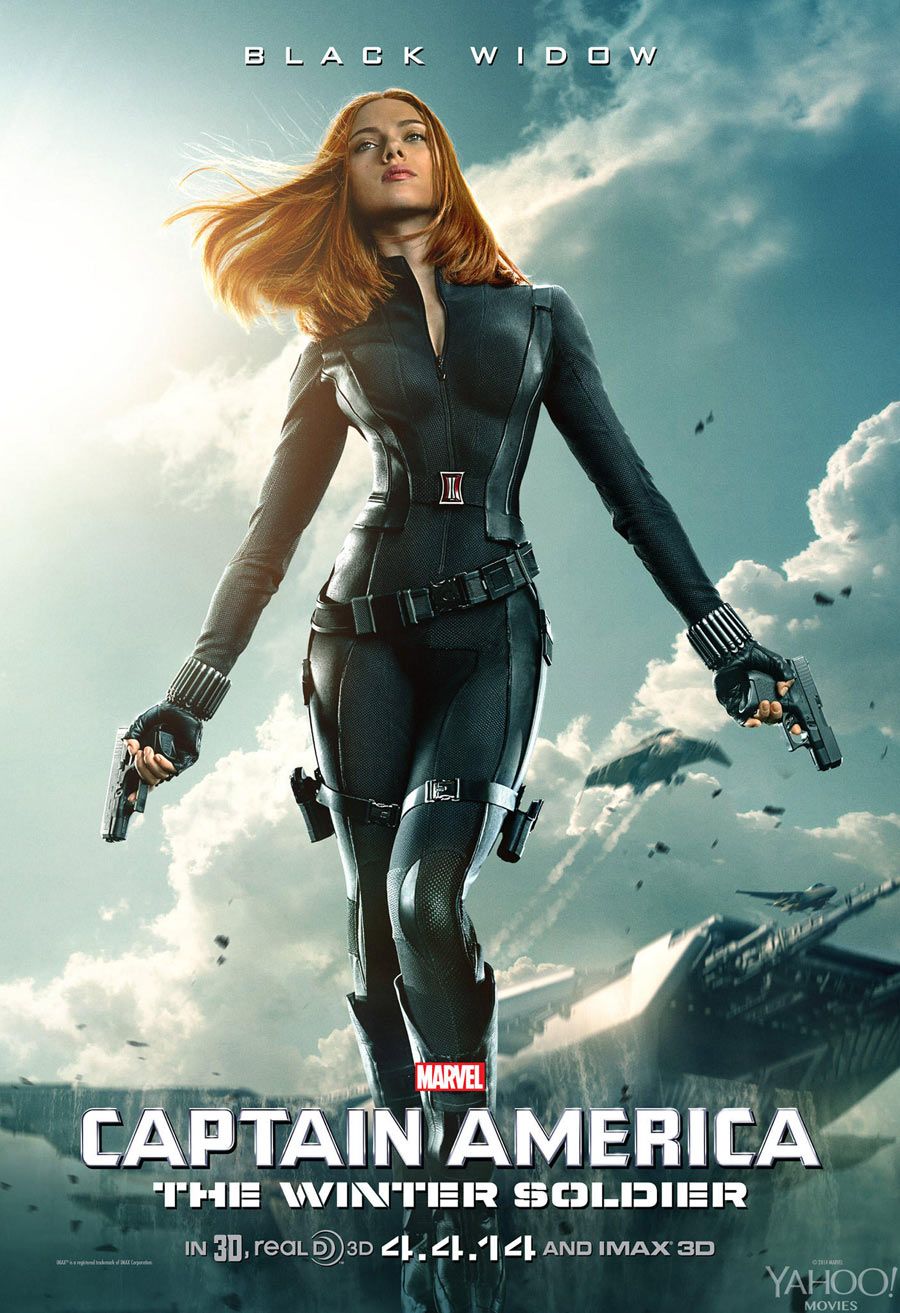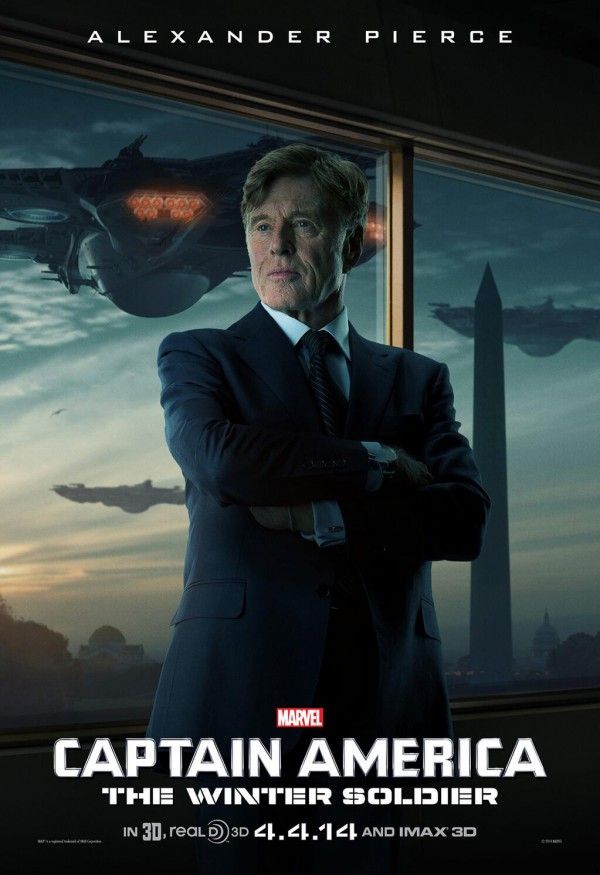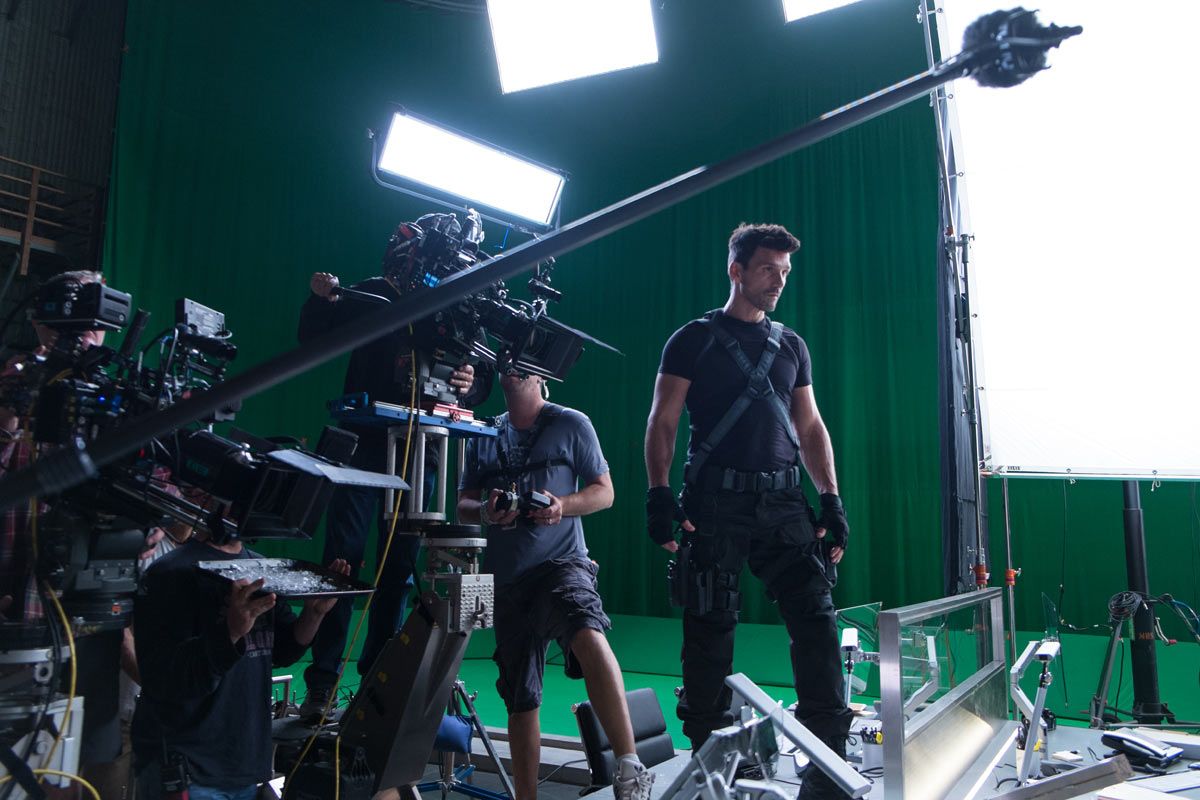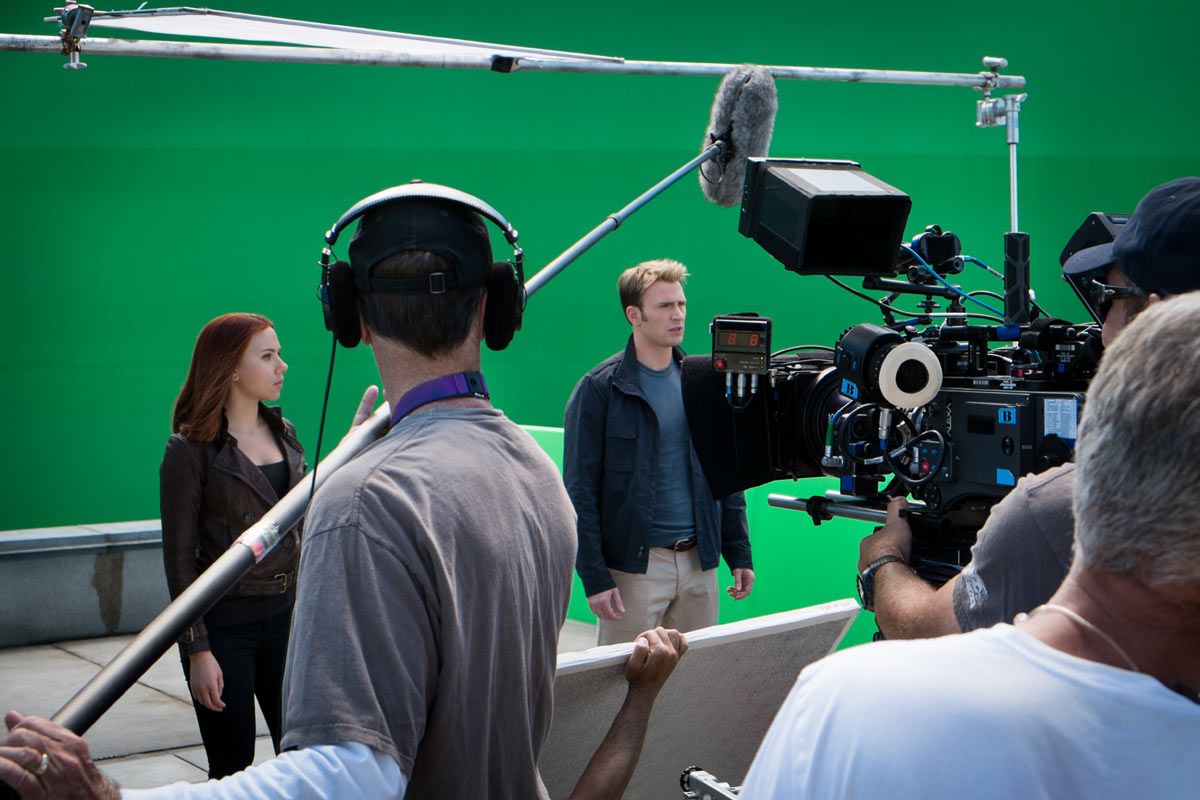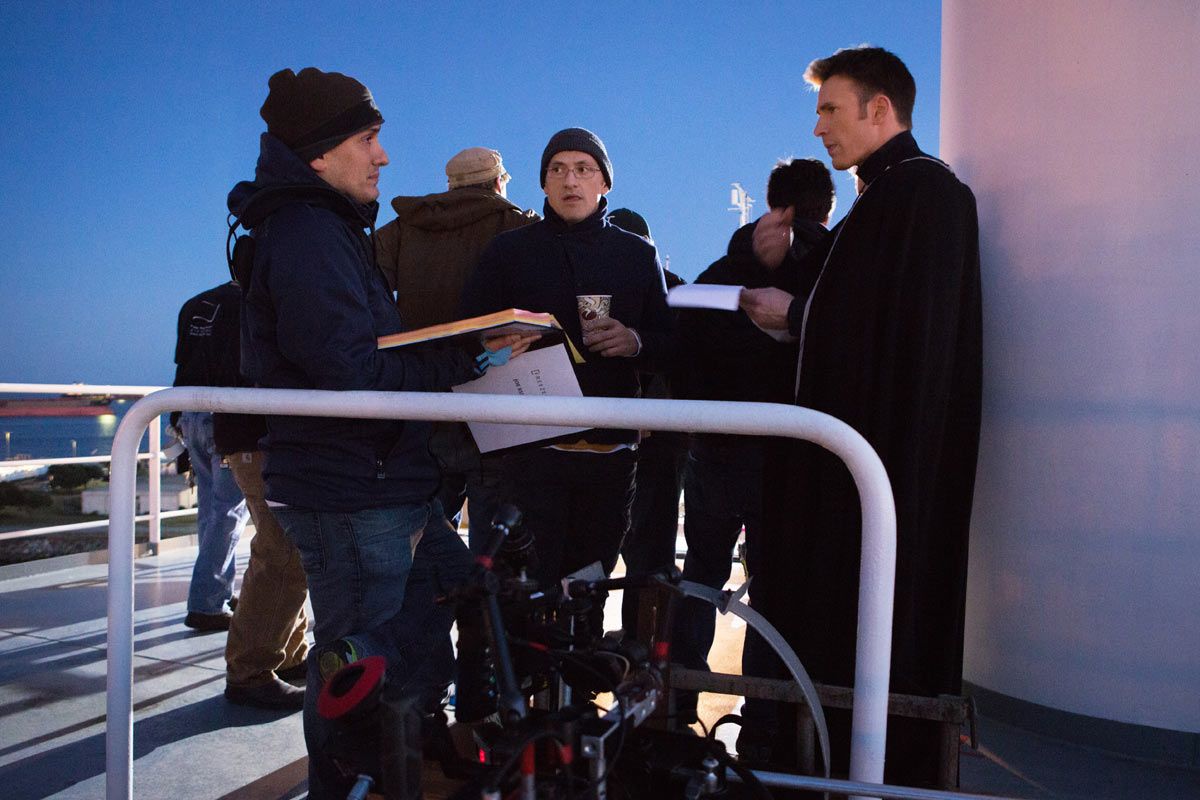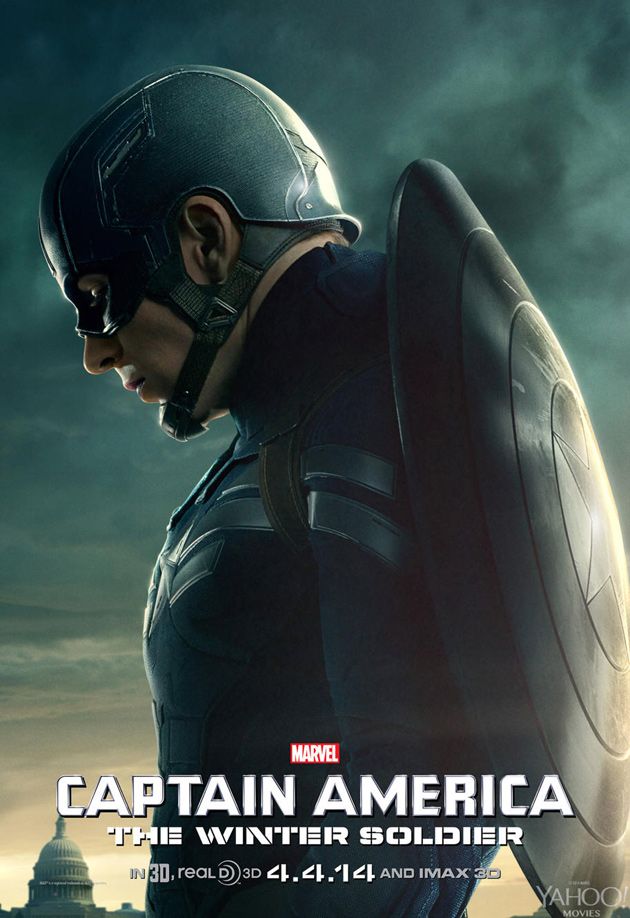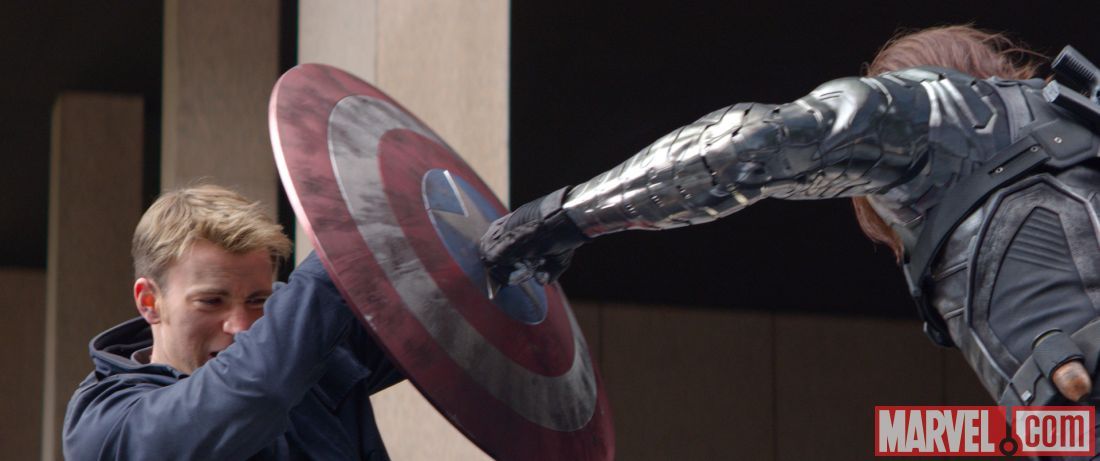Anthony Mackie Soars as "Captain America: The Winter Soldier's" Falcon | Joe & Anthony Russo Delve Into "Captain America: The Winter Soldier" | Co-Writers Markus & McFeely: "Winter Soldier" Will "Punch You in the Face"
It's hard to imagine all of the gears that must be turning in Kevin Feige's brain every day, but as the head of Marvel Studios, and the man largely responsible for its expanding empire of hugely successful blockbusters, he's clearly worked out everything from the blueprints on up. Speaking to him on the set of "Captain America: The Winter Soldier," Feige is utterly present, if only because his work seems constantly in flux -- not just working on one movie, but fitting that movie into a larger cinematic universe, and forecasting how that universe might grow after the current phase of its development gives way to the next one.
In between treks to the set of the film, which Joe and Anthony Russo are skillfully directing from a location in Southern California, Feige sat down with attending press to talk about his impressions of the sequel, and where it fits into Marvel's cinematic landscape. In addition to discussing its differences -- and goals -- as a single-serving superhero movie, he talks about the Marvel movie timeline, and how they hope to keep exploring their characters for years to come, and keep audiences guessing at the same time.
Joe and Anthony Russo have never done anything even close to like this. What was it about them that made them the perfect directors for this project?
Kevin Feige: Well, you know, it's worked out well for us when we've taken people that have done very, very good things. Very rarely are one of those good things a big giant blockbuster superhero movie. "Elf," Favreau. Good TV for Joss [Whedon]. Good Shakespearean drama 15 years ago for Kenneth Branagh. And I don't watch a whole lot of TV, but in the TV that I was watching that I found interesting, their name kept popping up. And then I knew they had also made that Soderbergh-produced movie with George Clooney ["Welcome to Collinwood"]. It was like, "Wait a minute." So they'd done this interesting stuff in TV and then they've done that movie which was interesting in and of itself. They had been popping up in the trades for being attached to various features. I said, "So obviously they're interested in features. Let's bring them in." And like all of our director choices it starts with meetings. It starts with are we connecting with a certain idea. And I'd pitched them our idea for "Cap 2." And you've heard me describe it ,which is a loose description, a broad description, as a sort of '70s political thriller, and they lost their minds. They just started coming back and coming back and coming back with great ideas and great ideas and great ideas. And I just believed they could pull it off. And now is where, you know, two-and-a-half weeks, three weeks from finishing, I feel very, very good about what we have so far.
Why is the time right for something like that now, as opposed to maybe a third entry in Captain America's story?
Well, this sort of is a third entry. I mean, there's "Cap 1" with his origin in World War II and only the last two minutes -- oh, my God, he's in the modern day. "Avengers" played a little bit with his feelings of what it's like to be in the modern day, but he didn't have a whole lot of time in that film because he's introduced to the team. He's got to fight off the alien invasion. So it did feel like this was absolutely the right time to deal with how he can come to terms with a past that is long gone and is seemingly never coming back. Dealing with the shades of gray of the modern era, and certainly of being a part of an organization like S.H.I.E.L.D. And then, just as perhaps he's finding a niche for himself, his past comes back and lands like a ton of bricks on his head in the form of Winter Soldier.
So why was that sort of '70s conspiracy thriller the right template to tell that story?
Well, we'll see if it was the right template when it's all finished and its working. But it's -- you know, we make a lot of superhero movies here at Marvel Studios and I believe the key is to make them all different and to make them all unique and to make them all stand apart while connecting together. And that's what the comics do, you know. You can find Captain America stories that are as sort of two dimensional and red, white and blue as you would think from the costume. Then you've got great stories in the seventies and eighties and then you have the amazing [Ed] Brubaker run, which is dealing with this notion of conspiracies and authorities and what it seems to be coinciding with when Cap returned in the early sixties, and then suddenly ten years later there's Watergate and he's gone through the seventies. That's interesting stuff to me. So we're sort of pulling from all of those tales for this story. And like the first film was a Marvel superhero origin story masquerading as a World War II propaganda movie, this is a Marvel superhero sequel masquerading as a seventies political thriller. And then, frankly, all the stuff that's happening now with the NSA and the news is just -- it's pretty amazing timing for us because that's much of what Cap is. That's the kind of thing Cap doesn't particularly like -- that our fake comic book organization and real life national security organization seem to be doing. Which, again, is always nice when your big, entertaining, fun movie can touch into some aspect of a grounded real world -- no matter how crazy that real world may be.
Comic book readers are accustomed to tonal and stylistic shifts in a character to enrich it. How are you going to help mainstream moviegoers adapt to the tonal and stylistic shifts in this movie from the first movie? It sounds like it's going to be pretty different.
It will. I mean, I'm betting that more people will have seen "Avengers" who are coming into Winter Soldier than saw "Captain America 1." It certainly can be a direct sequel to that film. It can also be a direct sequel to "The Avengers." And if you look at the whole Marvel Cinematic Universe, I think the audience has already been with us for that tonal shift. You know, they know when that Marvel flip logo comes, it can be an Iron Man-Tom Clancy techno thriller. It can be this fantastical, you know Thor film. It can be a World War II film. I mean, they've already stayed with us for all of these different genres under the umbrella of the cinematic universe that it's not about betting they'll come with us. I think they're demanding that we continue to evolve and grow and shift sort of our models.
He does have the most characters from "Avengers" continuing in S.H.I.E.L.D. with Black Widow. Did that just sort of naturally feel like that would be the right thing?
Yeah. You know, we always wanted -- as you've seen in "Iron Man 3" now, for Tony to go back to his world in Malibu and Stark Industries. Thor going back to Asgard. We weren't gonna send Cap back in time. We weren't gonna send him back to his home. He had nowhere else to go. That's part of the story. That's part of how we meet him at the beginning of the movie. And it just made sense that he was the one that stayed with, you know, what remains of the Avengers at the end of the movie.
We heard that this takes place a year after the "Avengers." Where does it fit into everything else -- like Iron Man 3, Thor 2?
It is smack dab between "Avengers" and "Avengers 2" -- it takes place after "Thor" and "Iron Man." So it's sort of the continuity of the release of the film is the continuity of the film as well. Which was sort of the case with the first Phase One films but it was a little trickier. But this very much, you know, the ramifications at the end of this film go directly into "Avengers 2." Much more so than the other films.
"The Avengers" was such a worldwide phenomenon I can imagine that it inspired a lot of people to go back and see the Phase One films. So to what degree can you kind of rely on that when you're making this movie in terms of not having to deal with going to backstory?
Well, we know that's true, right, because the Blu-ray sales and the DVD sales of the other films started going up again when "Avengers" came out -- when it came out again on home video. But frankly, I believe every movie should stand apart, right. If you hadn't seen "Star Wars," I think you'd probably watch "Empire Strikes Back" and get it, the same way, you know. I really think -- I think this movie should work. It needs to work for people who've not seen "Avengers" or "Cap 1." It needs to work for the people who've seen all of them. That's important to me, that the movies can play on multiple levels like that. So I guess it's -- you know, we're always on alert for getting too inside baseball, but at the same time, sometimes you can be so inside baseball that it'll just go over the heads of some. So as long as it's not distractingly inside baseball. Unless it's Hawkeye and Widow talking about, you know, Budapest in which case you know, "Oh, maybe some people thought there was another movie where that happened," but it didn't matter, right, because it was just about their backstory.
Talk about the big picture of Phase Two and then how ["Winter Soldier"] sort of fits in with your grand plan.
Well, it is about, you know, part of it -- talking about it from a filmmaker level as opposed to sort of a story level -- it's about -- and you've all heard me say this before, teaching the general movie going audience about the notion of the characters existing separately, coming together for specific events and going away and existing separately in their own worlds again. Just like comic readers have been doing for decades and decades. And part of my early, early goals was to get movie audience used to that -- to that kind of thing. And knock on wood -- so far with "Iron Man 3," it's worked. People sort of are accepting that there's just a time when they should be together, and there's a time when they're not. So that was one of the first goals which is why we made the "Iron Man 3" that we made, why we're making the "Thor" movie we're making and why Cap does sort of fold back into that a little bit more. And it's all about going deeper into the stories. The more moviegoers that see these movies and are participating in watching these movies with us, the more inside baseball you can be. And suddenly, it's not a small group of people, it's a large group of people. And that's what I like very much is that the continuity of the films now are becoming -- it's becoming known and accepted to, you know, like my friend's mother was asking me about -- is this character coming back? It's like, "How do you know that?" Because of the movies, which is great.
These amazing actors now, like [Robert] Redford, are they surprised when you approach them? Or at this point, have the movies have become so big that it's easier?
I think it varies. I mean, sometimes they approach us. I mean, sometimes they -- and Robert's not shy. Mr. Redford is not shy about the fact that his grandkids are a fan and he wanted to do something that his grandkids would watch him in. So that works out very well in those cases. You don't have to do quite the song and dance. They sort of -- they know what we are already, and I do think, until we royally screw it up, they think it's a safe place to come and put on a costume and stand in front of a green screen and at the end of the day come off, you know, very well.
"Guardians of the Galaxy" is going out there on a limb. Is there any way that you feel the need to protect yourself -- or create a safety net for those sorts of risks?
Well, I mean, I think we've always been rewarded for taking risks. I think when Fox hired Bryan Singer, it was a risk back in the day. I think obviously Downey was a risk at the time, and I had to twist a lot of arms to get that -- push that through. So -- and by the way, when we were doing the first "Iron Man" film, the X-Men franchise had already been a giant hit. The Spider-Man franchise was already a giant hit. So you -- the safety net becomes Marvel itself. It's that red brick logo on top of the title -- right now means something to people, the way the Pixar thing does. People go, "Oh, I get kind of what this is will be." So it did seem like now is the right time to do something like "Guardians," which is different. I don't know how big the Iron Man fan base was. We all knew what it was. We all knew Thor, but they didn't know much more than that. Those were not well known. "Guardians of the Galaxy" is even less known than that. They had been in some cartoons. They'd been in video. But most importantly, you always just want to make a good movie. You always want to make it an interesting movie that plays for people whether they have a deep affinity or nostalgia for the characters or not. And with "Guardians," it's sort of liberating, because there are very few people that have the nostalgia for that. We're still being true to the books. We're still pulling all our favorite elements from those books to make the movies. But I like that most people will think and experience it as a brand new and fresh film.
Are you past the arm twisting phase of having to get things done? Are people more understanding your vision or at least letting your success get you past some things you might have had to push more?
I think so, but to be fair, Marvel has always been unified. It's sort of the reason we were gonna start doing movies ourselves, was to tell the stories the way we wanted to. And I don't know why it's the case that the actual, you know, property owners are the ones that were willing to go take further risks with their material than the licensee studios were back in the day. But I'm glad that was the case. And it's definitely the case. And I think, frankly, that's because we just understood the characters more or believed in the characters more. But I don't want to suggest that it's like it's me against the world. It's not. Marvel has been very unified in the way we want to proceed.
Captain America's a very virtuous character, which is kind of anachronistic, especially when we keep making superheroes dark and gritty. What do you have to do to ensure that he doesn't seem old fashioned in today's world?
I don't mind if it feels old fashioned. I don't mind if he feels out of place. He is out of place, and he is kind of old fashioned in the modern era. I care if he feels two dimensional. I care if he feels boring, or if he feels in any way not like a fully-formed character. But in this movie, we're embracing that side. That's part of his conflict, with Fury and with some of the other members of S.H.I.E.L.D., is the fact that he has a -- he's from a different place. He has a different set of values, I think. Or at least he thinks he does, initially. And we want to play into that and run towards that which creates conflict, which creates drama, which creates character.
We're careful not to make him a goofball fish out of water, you know. We don't spend a lot of time with him trying to understand what an iPhone is. He's, you know, if you took a 23-year-old -- what do we call the cap, I don't know, 27? If you took a 27-year-old and introduced him to something they've never seen before, they'd probably figure it out. They wouldn't be completely flummoxed about that. So we're avoiding sort of the, what is a cell phone? What is this magic glass that you type into? We have some fun with it. And frankly Cap because he's been around in the modern day for a little while post-"Avengers." He sort of has fun with peoples' expectations. He sometimes pretends not to understand something when he does. He goes, "Oh, I forget."
What are the joys and pains of making movies the way that Marvel does, with an eye on other movies and interconnectivity and an eye on secrecy?
Well, it's all pretty great. I mean it's, you know, as we keep making them we -- I want to keep an eye on not painting ourselves into a corner or not. Because again, a lot of what we're doing is modeled on the comics, but there's also pitfalls to look out for. There's a reason, you know, comic universes have to reboot after 10 or 15 years, because they start to fold in on each other and it becomes very, very confusing. I think that's less of a danger when you're only doing, you know, four hours -- four-and-a-half hours of entertainment a year -- two movies a year. But that's one thing that we want to be careful to avoid. I don't think we're anywhere near that yet, so it's really all just sort of fun, to be able to have access to all those characters and all those stories as we make them.
The secrecy thing -- I don't know that it's unique to us. I think every filmmaker wants to save the surprises for the screen. You know, we've got security guys walking around on every set and holding up 'Don't Take Pictures, Please' signs and things like that. And everyone's taking pictures of it -- you know that's gonna happen. We sort of stopped chasing that, frankly. I mean, I think people are savvy enough now to know that if a picture's taken from behind a tree with a long lens -- if the pictures look great, as most of "Winter Soldier's" pictures looked pretty cool, I thought, some of them look like professional -- like really damn cool. You know, we used to try to get ahead of that and do our own photo shoot beforehand, but the truth is, we just spend all of our time getting ready for that day when he's gonna be in front of the movie cameras for the first time. And sometimes, a picture appears behind a tree with a long lens and they guy doesn't look great or it's a stuntman. I do think people are savvy enough to know, "Oh, that's not the way it's going to look in the movie." So it's just the way it is now, and I've always said, the only thing worse than a photographer in a tree is no photographer in the tree because nobody cares. We're filming a big street, there's nobody here. I thought that happened to us once in "Iron Man 2." We were filming in Randy's Donuts in "Iron Man 2," and there was nobody there, and I was like, because nobody cares. And we go home and there's this unbelievable shot of him from a building [nearby].
Are you guys actually playing now with expectations, given the speculation and rumor-mongering that goes on so often?
I'm wondering if there's a clever answer to that. The answer is, "No," but I don't know. Maybe that gives away the game. No. I wouldn't know how to do that. Sometimes we've talked about -- talk about name and put something out there. I think a few years ago we tried that, and they were like, "Shut up, we don't believe you." But, no. I mean, it's much of -- you know, some of the information isn't true. Sometimes, when it comes to casting, because their agents, because people know who's coming in for meetings and things like that -- rarely is information 100 percent private. And sometimes it's completely off the mark. And that's funny, and that becomes its own business for me. Right? I mean, people who thought that Tony was gonna go to space to meet the "Guardians of the Galaxy" at the end of "Iron Man 3?" Okay. They can think that. So it almost creates -- people are doing misinformation for us.
valnetvalnet
"Captain America: The Winter Soldier" opens on April 4.


